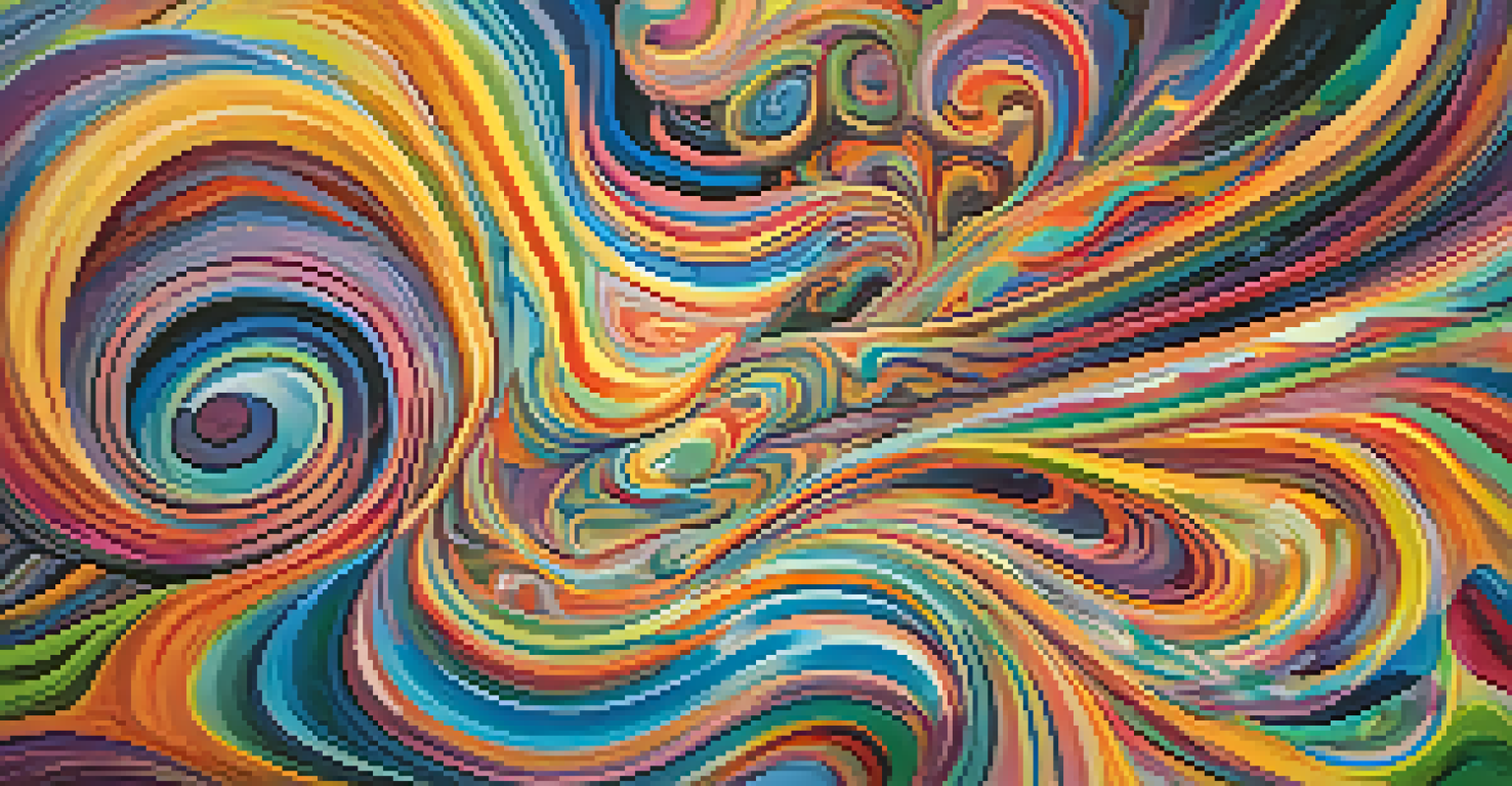Hallucinogens in the Works of Aldous Huxley and Beyond

Introduction to Aldous Huxley and Hallucinogens
Aldous Huxley is best known for his thought-provoking novels, particularly 'Brave New World.' However, his exploration of consciousness and altered states is equally significant. Huxley had a keen interest in hallucinogens, which he believed could expand human perception and understanding. This fascination is evident not only in his writings but also in his personal experiences.
There are things known and there are things unknown, and in between are the doors of perception.
In the early 1950s, Huxley famously experimented with mescaline, a hallucinogenic substance derived from the peyote cactus. His experiences led him to write 'The Doors of Perception,' a foundational text that describes his profound insights while under the influence. Huxley's work offers a unique lens through which we can examine the interplay between psychedelics and creativity.
Huxley's exploration of hallucinogens serves as a catalyst for broader discussions on consciousness, spirituality, and artistic expression. His perspectives invite readers to consider not just the substances themselves, but the potential for self-discovery they can unlock.
The Doors of Perception: A Dive into Huxley's Mind
'The Doors of Perception' provides an intimate glimpse into Huxley's mind during his mescaline experience. He describes vivid visual hallucinations and a heightened sense of awareness that challenges conventional reality. The book's title itself references the idea that psychedelics can open doors to new ways of understanding the world around us.

Huxley articulates how the experience transcended mere visual phenomena, leading him to profound philosophical reflections. He contemplates the nature of reality, the limitations of language, and the connection between perception and existence. These themes resonate deeply, encouraging readers to ponder their own perceptions of reality.
Huxley's Insights on Hallucinogens
Aldous Huxley's exploration of hallucinogens highlights their potential to enhance creativity and self-awareness.
Ultimately, Huxley's narrative is not just about the drug experience; it's about the insights that can arise from altered states of consciousness. He posits that hallucinogens can serve as tools for exploring the deeper aspects of the human psyche, offering a pathway to greater self-awareness.
Psychedelics as a Tool for Creativity and Insight
Huxley believed that hallucinogens could enhance creativity and problem-solving abilities. He saw them as a means to break free from conventional thought patterns, unlocking new avenues for artistic expression. This notion has been echoed by many artists and thinkers throughout history who have sought inspiration through altered states.
Psychedelics can serve as tools for exploring the deeper aspects of the human psyche.
For instance, the use of psychedelics in the 1960s counterculture sparked a wave of artistic innovation. Musicians, writers, and visual artists reported that substances like LSD opened up their minds to new forms of expression and creativity. Huxley’s ideas laid the groundwork for these explorations, emphasizing the potential of psychedelics to reshape artistic landscapes.
Moreover, the relationship between hallucinogens and creativity continues to be a topic of interest today. Many contemporary artists and scientists are revisiting Huxley’s insights, exploring how these substances can foster innovation and profound insights in various fields.
Huxley's Influence on Counterculture and Psychedelic Research
Aldous Huxley's writings significantly influenced the 1960s counterculture movement, where psychedelics became synonymous with liberation and exploration. His philosophical musings on consciousness resonated with a generation seeking deeper meaning beyond societal norms. Huxley’s work inspired many to experiment with psychedelics in search of enlightenment and personal growth.
Moreover, Huxley’s advocacy for the responsible use of hallucinogens paved the way for more serious research into their therapeutic potential. As the counterculture faded, interest in psychedelics waned but never disappeared. Recent years have witnessed a resurgence in psychedelic research, exploring their applications in mental health treatment and personal development.
Cultural Impact of Psychedelics
Huxley's writings significantly influenced the 1960s counterculture, promoting the use of psychedelics for personal growth and liberation.
Huxley's influence persists as modern scientists and psychologists revisit his ideas, examining how psychedelics can aid in understanding the human mind. His legacy serves as a bridge between literature, philosophy, and contemporary scientific inquiry.
The Legacy of Huxley’s Ideas in Contemporary Society
Today, the conversation surrounding hallucinogens is more relevant than ever, particularly with the growing interest in their therapeutic benefits. Huxley’s insights into consciousness and perception continue to inspire discussions about mental health treatment and personal exploration. His work encourages a reevaluation of societal attitudes towards psychedelics.
In various fields, including psychology and neuroscience, researchers are exploring how substances like psilocybin and MDMA can aid in treating conditions such as PTSD and depression. Huxley’s pioneering thoughts on these matters provide a philosophical backdrop that resonates with current scientific pursuits.
As we navigate the complexities of modern life, Huxley’s legacy prompts us to consider the deeper implications of our consciousness. His exploration of hallucinogens challenges us to seek understanding beyond the surface, inviting a renewed appreciation for the human experience.
Hallucinogens in Literature: Beyond Huxley
While Huxley’s contributions are significant, the exploration of hallucinogens in literature extends well beyond his works. Numerous authors have engaged with the theme of altered states, weaving it into their narratives in various ways. Writers like Jack Kerouac and Ken Kesey utilized psychedelics as tools for creative expression and social commentary.
In contemporary literature, hallucinogens often serve as metaphors for self-discovery and transformation. Authors explore the impact of these substances on personal identity, spirituality, and the quest for meaning. In this context, hallucinogens are not merely drugs; they symbolize the journey toward understanding oneself and the universe.
Future of Psychedelic Research
The resurgence in psychedelic research today reflects Huxley's vision of their therapeutic benefits and the exploration of consciousness.
This literary exploration reflects a broader cultural fascination with consciousness and the human experience. As writers continue to delve into the theme of hallucinogens, they contribute to an ongoing dialogue about the complexities of perception and the quest for deeper understanding.
The Future of Hallucinogens in Society and Culture
As societal attitudes towards hallucinogens continue to evolve, we find ourselves at a pivotal moment. With growing acceptance and emerging research, the future of these substances in society holds promise for both medical and creative avenues. Huxley’s vision of hallucinogens as tools for exploration remains relevant as we seek to understand their potential benefits.
Moreover, the integration of hallucinogens into therapeutic settings opens new doors for healing and self-discovery. As mental health awareness increases, the demand for innovative treatments has led to renewed interest in psychedelics as viable options for therapy. This shift could lead to transformative changes in how we approach mental health care.

Looking ahead, the challenge lies in ensuring responsible use while fostering an environment of understanding and respect for these substances. Huxley’s legacy reminds us of the importance of thoughtful exploration, encouraging us to seek balance as we navigate the intersection of science, culture, and consciousness.